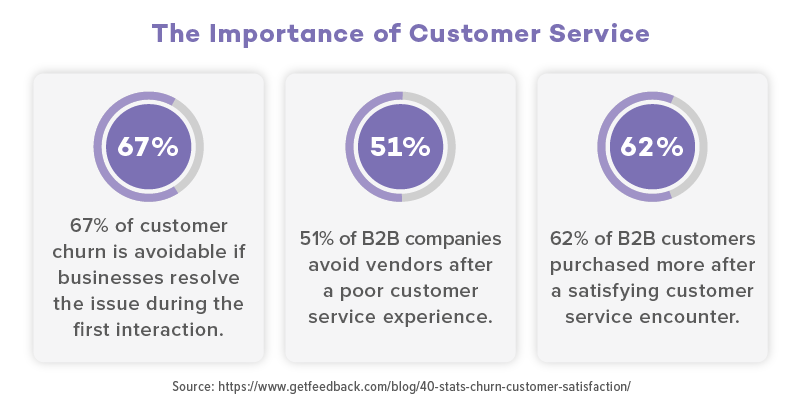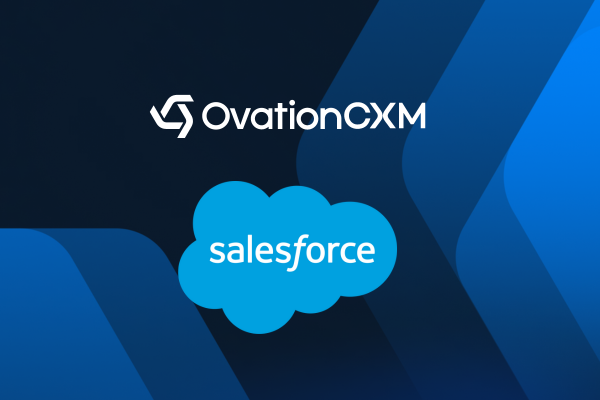In the past, outsourcing customer service typically meant contracting an off-shore call center, which, while being affordable, has its drawbacks.
Today, there is a growing number of US-based support providers that cater to specific niches and employ highly-trained specialists, meaning that support representatives are equipped to deal with even the most technical questions in your field of specialty. These services free up your own in-house support technicians to tackle the most challenging, high-value support queries.
Don’t think about outsourcing support as “cutting corners.” Instead, think of it as you doing everything you can to fulfill your customers’ support needs to the best of your abilities to ensure they keep coming back for more.
A flood of new customers is a thing to be celebrated. However, if you struggle to handle the onslaught of emails, voice calls and live chat inquiries that goes hand-in-hand with business growth, you’ll end up losing customers who grow frustrated.
Why B2B Customer Service Is So Important
Customer Service is more vital now than ever. In our increasingly connected world, customer expectations are higher than ever before, and B2B customers, in particular, expect a more hands-on, personalized approach.
Imagine you’ve purchased a software tool for your business but your employees keep mentioning that it’s difficult to use or not performing as expected. In order for your decision to use this particular software to be justified and demonstrate ROI, it needs to make your team’s jobs easier, not more difficult. In this scenario, receiving product support that addresses your concerns will likely decide whether or not you continue using this software or try a different one.
B2B customers are likely to have more complex, unique technical issues and resolving these concerns can take a fair amount of time and effort, requiring members of multiple teams to work together to solve the problem.
For instance, a problem involving a product functionality or server issue can take hours to resolve and requires careful coordination between the IT and product teams. This can be made significantly easier by using a product support platform that facilitates easy multi-channel collaboration and gives each team a holistic overview of the current ticket and the customer’s ticket history in a consolidated dashboard.
Product support can be a significant differentiator in the highly competitive merchant services industry, particularly considering the fact that various merchant services providers often charge similar prices. Providing customers with support that exceeds their expectations not only ensures that they continue to choose you over competitors but may result in referrals. On the other hand, failing to provide timely, personalized support causes customers to become impatient and frustrated, which may lead them to switch to a competitor.
Whether a customer requires assistance troubleshooting issues with their POS equipment or reviewing their merchant statement, outsourcing support can ensure that the interaction is not only pain-free but offers the best possible solution.
For B2B customers, referrals are a key way of generating new business. As such, it’s essential to ensure that existing customers are satisfied not only with the product but with the level of support they are receiving. These days, B2B companies compete not only on product quality but on the quality of the service they offer. In fact, Customer service is reportedly the number one factor impacting buyer trust in vendors.

The Benefits of Outsourcing Your B2B Support
Customer support is a challenging and often stressful job due to the strain of dealing with frustrated and even angry customers. The support agent’s job is to ensure that the customer leaves the interaction feeling satisfied that their query has been successfully dealt with or will be resolved soon – no matter what it is.
It’s vital that the support agent is highly knowledgeable about not only the product itself but also limitations and common issues, as well as any possible integrations.
As a result, the cost of training is high, which wouldn’t be a problem, given the importance of providing reliable product support, except for the fact that this industry tends to have a very high turnover due to the stressful nature of the job. Luckily, with outsourcing, you don’t need to worry about any of this.
Outsourcing to an omnichannel support vendor allows you to reduce costs, minimize the use of core internal resources, and enable greater data collection capabilities by offering additional customer touchpoints, which can in turn drive more informed decision making.
Let’s take a closer look at some of the benefits of outsourcing B2B product support.
Realize Cost Savings
Outsourcing your product support – or even just some of it – can realize significant savings with regards to overheads, tools, and technologies, not to mention the cost of hiring and training staff, particularly given the industry’s high staff turnover. Delaying rolling out or scaling product support by even the few months it takes to establish a traditional call center can result in lost revenue due to churn.
Improve Quality of Service
Companies that specialize in support continuously work to improve their service to keep up with or surpass industry standards. As such, they’re equipped to offer higher quality support than you might be able to if you have to build a product support operation from scratch in-house. Moreover, professional product support vendors ensure that their staff are highly professional and thoroughly trained for the job.
Gain Flexibility to Accommodate Volume Spikes
Seasonal spikes in sales volumes can cause chaos for companies that don’t outsource their product support or don’t have the capacity to scale their support in busy periods such as holiday seasons or during promotions and product launches. During these periods, customers are under additional strain and more likely to churn if they do not receive satisfactory product support.
Offer Omnichannel Support
Outsourcing product support allows companies to offer their customers multi-channel support without needing to make significant investments in infrastructure. Product Support providers often cater to a variety of customer engagement channels including email, voice call, live chat, mobile text apps, social media, and more. Allowing customers to communicate using their preferred channel sets them at ease and promotes brand loyalty.

Offer 24/7 Product Support
Outsourcing or automating some or all of your product support can enable your business to offer round-the-clock support, which is particularly vital for businesses with international customers or customers who use their product at all hours, as is the case in ecommerce.
Improve Data Analysis Capabilities
Good customer service vendors record all customer interactions and use state-of-the-art analysis tools to provide you with a transparent view of how you can improve not only your product support strategy but also your product itself. In-depth insights can help you to upgrade your knowledge base, enabling you to offer product support that gets better and better over time.
Effortless Comply with Regulations
How much do you know about laws regulating support-related activities such as recording calls, auto texting, making phone calls that could be considered telemarketing, and email best practice? Do you know how these rules vary from state to state and country to country? When you outsource your product support to a reputable vendor, you don’t need to worry about it.
Scale Internationally with Ease
Outsourcing product support not only allows you to grow your business without stressing about your ticket volume going up, it also offers benefits that make it easier to scale internationally. For instance, 24/7 availability allows you to cater to different time zones. You may also be able to offer multilingual support channels, which is crucial when expanding into markets where English is not the dominant language.
Reduce Response Times
More hands on deck, combined with state-of-the-art workflow automation tools such as ticket routing and chatbots capable of fielding frequently asked questions, can make a significant impact on your average resolution time, which goes a long way towards improving customer satisfaction. When you automate parts of your support ecosystem, you allow your agents to spend their time building stronger relationships with your customers, which is really what support is all about.
Proactively Address Customer Issues
Outsourcing your support to a vendor that can perform remote monitoring on your products to detect issues before they can cause problems for your customers can be a game-changer. Being able to alert customers to potential problems and inform them that you are working to restore full functionality before they contact you – or before they even notice anything’s amiss – can really set you apart from competitors.
Personalize Interactions
By partnering with a vendor whose offering includes automating your product support, you gain the ability to offer your customers more personalized service. For instance, enabling agents to view a customer’s entire product and ticket history allows them to refer to this context in their interaction with the customer, making the customer feel seen. Additionally, interactions can be routed to the same personnel (or manager) who previously engaged with specific customers to create continuity and thereby build stronger relationships.
Simplify Cross-Team Collaboration
B2B issues can be complex, necessitating collaboration between multiple teams to resolve a problem. This collaboration can be time-consuming and convoluted if you don’t have a good system in place, but a good support partner will allow you to share visibility of each ticket with other teams, enabling much smoother, more efficient collaboration.

Addressing Concerns About Outsourcing Your B2B Support
Despite all the benefits of outsourcing B2B support, you may still be reluctant to take the plunge and hand your product support over to someone else. That’s perfectly understandable. You’ve spent time building your business and may have some reservations about trusting another company with your relationships with your customers.
Let’s take a look at some of the common concerns about outsourcing.
Product Support Vendors Serve Other Clients
When you consider outsourcing your support, you may fear that your company’s product support will suffer because you are not their only client. You may even fear that the support agents assigned to your business may be juggling your tickets with those of other companies, rushing through interactions with your customers, or giving incorrect or incomplete information because they’re preoccupied with providing support for other customers – or even your competitors!
Rest assured, you can mitigate all of these concerns by discussing them with your support partner. You can ask them to assign specific agents to exclusively work for your business, functioning as an extension of your team. Moreover, with the advanced customer service dashboards, knowledge base and predictive surfacing solutions available today, it’s easy to ensure that agents have access to all your product information almost before they need it.
You Could Lose Control of Your Brand
Another consideration that could make you reluctant to outsource your support is that you run the risk of losing control of your brand. After all, how can you be certain that the firm you outsource to will be as passionate about your brand and treating your customers with the same standard of care that you are? Another – related – concern is that outsourcing can cause a disconnect between strategy and brand voice.
However, both these concerns can be easily avoided if you choose a vendor with a track record of thoroughly training their staff not only in product knowledge but also in your vision, values, strategy and brand voice. The key is to select a firm that will function as a partner and focus on customer satisfaction, not just closing tickets as quickly as possible.
Culture Disconnect
Another concern worth taking into account is the risk of a “culture rift” forming between your outsourced support team and the rest of your team, with team members having difficulty relating to one another. Additionally, in organizations with an entrenched hierarchy, some employees may have difficulty transferring control to an external specialist.
With all the recent advances in communications technologies, teams no longer need to be co-located to be able to work together and form strong bonds. Choosing a vendor that uses integrated collaboration tools can help to mitigate disconnects and promote engagement. Meanwhile, establishing a carefully laid out service level agreement and implementing reporting standards should mitigate any potential “territory” disputes. Again, the key is to focus on finding an outsourcing partner.
Considering Outsourcing Your B2B Support?
Outsourced B2B support comes in all shapes and sizes, offering varying capabilities and quality of service at wildly disparate price points. Remember, what you consider good customer service may not align with what the firm you’re considering outsourcing to considers good service. Be sure to do your research and ask questions about what matters to you.
Customer support no longer has to entail a call center halfway around the world that may or may not be delivering the service they promised. These days, you can find a local, US-based support partner that keeps you in the loop and offers complete transparency through detailed reporting.
Some support partners, like Boomtown, even provide on-the-ground technical support, digital asset monitoring, and preventative maintenance, all to ensure that your customers experience as little downtime as possible. It may sound too good to be true, but rest assured, it’s real.
While it’s true that outsourcing can cut costs significantly, this shouldn’t be your primary motive. At the end of the day, the main reason for investing in B2B support is to build stronger relationships with your customers, as this is what keeps them choosing you – and recommending your business to others.
Choosing the right partner is the first step to offering your B2B customers the kind of support they expect.
Why not see what Boomtown has to offer by scheduling a free demo?





